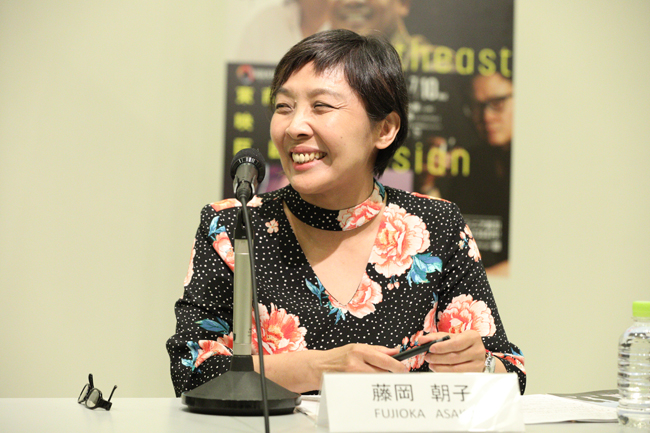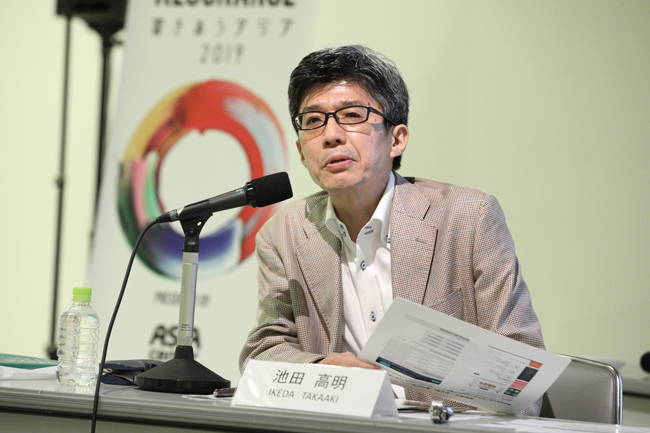Challenges and Prospect of Human Resources Development in the Film Sector
Ikeda: There are support programs for Japanese filmmakers who want to go abroad. Since, on the whole, we tend to be reclusive, we may change if more people come to Japan from abroad and stimulate us.
Ichiyama: If Japan has funds to invest in Asian films, this would make a big difference. At some point in history, NHK invested in Asian films (NHK Asian Film Festival). If such funds are available, people actively seek to come to Japan, giving rise to human interaction. Another reason for coming to Japan is a location. Southeast Asian directors often ask me about it, but if we have funds or organizations that provide financial support, they will come to Japan more often.
Ikeda: Your suggestion on Asian funds in Japan is very important. Recently, the Korean Film Council (KOFIC) has established a partnership with ASEAN.
Fujioka: But Japan's charm is not just about money. We have a natural environment and landscapes to cultivate creativity. We also have hot springs and nice locations. I find it very nice that they can meet Japanese audiences during their short stay at film festivals. I've heard that a filming crew came to Hokkaido for a long-term training camp and fell in love with Japan. We can also list values, including Japanese culture and life as well as know-how that the history of Japanese cinema has built. Even if Japanese people cannot raise their hand to give a quick response, like "Yes, that's it!", at seminars, they have built something inside, which is hard to talk about or communicate unless they share time. So, rather than money, Japan can provide time. In the age that accelerates the world, especially Southeast Asia, Japan has entered the era in which she can suggest a slow place or a relaxed way of life.

Ikeda: Let us now open the floor to questions. Before that, we have pre-registered questions about film festivals and management. If I go so far as to say that film festivals all converge in making and showing films. I recommend a very good book for studying how to show films to audiences and send films to them. It was published 25 years ago. It is titled Geijutsu Keieigaku Koza (4) Eizo-hen (Arts Management Course (4) Film, edited by Masamichi Matsumoto and supervised by Akihiko Sasaki, Tokai University Press, 1994). I suggest you read this once.
Audience: At film festivals, young Southeast Asian or Chinese directors are very fluent in English and can respond to Q&A in English. But I have seldom seen young Japanese directors communicate a passion for their films in English. They need to acquire language skills so that they can interact with young Asian directors.
Ikeda: "Pitching" refers to presenting one's own plan in English. Some are already doing that, of course, but if this is generally unknown, the film industry is responsible for that. Ms. Fujioka, you also act as an interpreter. Could you share your experience with us?
Fujioka: I can get credit for introducing director Jia Zhangke to Mr. Ichiyama (laugh). I remember well meeting him for the first time. "As Chairman Mao did not speak English", he said smilingly in broken English, "the level of English education was very low at public schools". But his English has rapidly improved. Nationality has nothing to do with it. If you have something to communicate, you can master it.
Ichiyama: At the beginning of his career, Jia Zhangke had no money to hire an interpreter when he was invited to international film festivals. He had to go alone there. So, he was driven into a situation where he had to speak English. He had of course an interpreter for Q&A sessions, but he was on his own at parties where he was forced to speak English. I think I met him for the first time at the Berlin International Film Festival in February 1998. In October of the same year his English slightly improved at the Busan International Film Festival. In 2013 his A Touch of Sin won the Best Screenplay Award at the Cannes Film Festival, where he made speech in English though he was with a Chinese interpreter. Japanese directors prefer to have Japanese interpreters as they are afraid of making mistakes. By contrast, Jia Zhangke evidently wants to communicate what he has to say in his own words where possible. He does not care much about grammatical mistakes. Instead, he is brave enough to speak for himself. That's his character, and he has willingness to communicate in English. He himself calls me for years. He is so fluent as to directly talk to me in English.
Fujioka: To add one more word, I don't want directors to be afraid of using an interpreter. When action precedes language to collaborate during filming, there may be something more important than language. When director Ryusuke Hamaguchi was selected by the Hong Kong Asia Film Financing Forum, the Hong Kong International Film Festival, he said, "I must be grateful for this award to my interpreter" on stage. I thought this was wonderful. Selecting a good interpreter is one of a director's staffing abilities.

Ikeda: In that sense, it may be important to consider support for those who cannot speak English by providing interpreters. As they get used to speaking English, they will speak in words of their own. Finally, I would like each discussant to make a final comment.
Yasuoka: Today I presented the Asian Docs Co-production Network Forum, which will continue into the future. However, grants from film festivals are not necessarily constantly guaranteed. How can we stabilize a co-production environment? Each project has a big challenge. Hopefully, stable funds can constantly support international action. As this greatly inspires my Japanese students, I hope to continuously expand it more and more.
Fujioka: I am of the same opinion. I always find it difficult to hold long-term vision in continuing the Yamagata Documentary DOJO and other film festivals. When it comes to planning ahead or stable management, we can only receive a single-year grant six months prior to the film festival. This way of management has its limitation. I am at a loss how to secure stable funding. In the West workshops like ours charge something like JPY300,000 or JPY500,000 as participation fees. Do we have to do the same? I'd like to hear your advice.
Ikeda: As for the issue of arts funding, the Saison Foundation has created very innovative programs. If you are interested in this, I will recommend a book by Mr. Masao Katayama of the Foundation (currently, president), Saison Bunka Zaidan-no Chosen: Tanjo-kara Tsutsumi Seiji-no Shi-made (Challenges of the Saison Foundation: From its Birth to the Death of Seiji Tsutsumi, Shosekikobo Hayama, 2016).
Ichiyama: Currently, like the former Japanese cinema, Chinese cinema has huge momentum. It has at least sufficient funding for operating within China. Conversely, while many major films are successful in Japan, it is getting very hard to raise funds within Japan to create independent films. They somehow manage with low budgets, occasionally causing problems of ill-paid staff. But they are coping with the situation. They are almost in a similar situation to Southeast Asian filmmakers. This may be one of the factors for increasing Japanese applications for the Talents Tokyo. Some are willing to co-create films with international people. If we can provide some forms of support for them, they can surely spread their wings. It will be nice if I can support them in a number of ways.
Ikeda: Lastly, there is one thing all of us here present can do to contribute to human resources development in film industry. That is, watching films. Film cannot exist without audiences. The Asia Center funded by the Japanese government's "WA project"--Toward Interactive Asia through "Fusion and Harmony"-- has secured its budget only up to FY2020. While we need to scrutinize (how public funds are used), please support the Japan Foundation Asia Center so that it can continuously carry out its valuable activities.
[On July 3, 2019 at Tokyo Metropolitan Theatre Gallery 1]
Moderator: Takaaki Ikeda
After working as a programming producer for a film channel, Ikeda joined Media International Corporation (currently NHK Enterprises) in 2007. Since then he has been engaged in purchasing films and TV programs as well as licensing. Currently, he works for Corporate Strategy Bureau. Since 2011 he has been a selection committee member of the Talents Tokyo. He is also a member of the Japan Association for Cultural Economics.






